Results
-
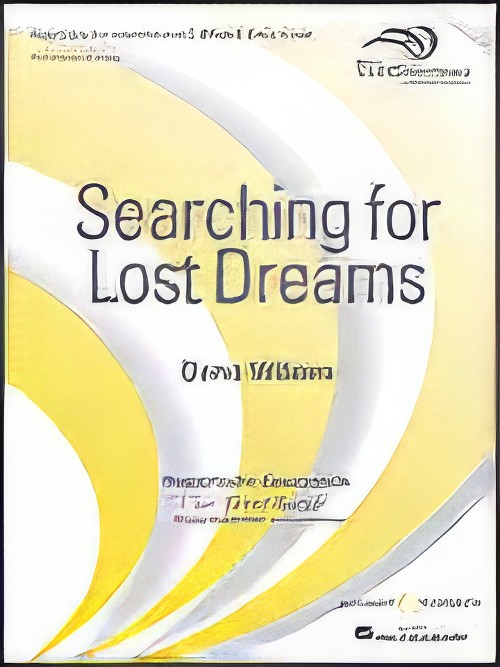 £145.00
£145.00Searching for Lost Dreams (Windependence Concert Band - Score and Parts) - Wilson, Dana
As I began this piece, it was as though I were entering a dream. The music was atmospheric, undefined, and somewhat disorienting. Gradually the material became more focused, but just in time to switch to a very different--though related--sound world, which became the second movement. The overall poignancy, varied sound worlds and dramatic shape of the music suggested the title. - Dana Wilson Duration: 8:00
Estimated dispatch 7-14 working days
-
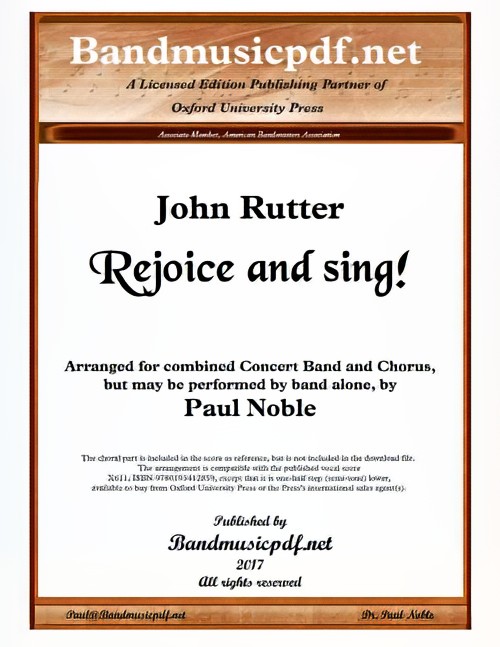 £85.00
£85.00Rejoice and Sing! (Concert Band with Optional Choir - Score and Parts) - Rutter, John - Noble, Paul
Rejoice and sing! was written in celebration of the 95th birthday of Sir David Willcocks. John Rutter writes: I was delighted to be asked by OUP to compose a new carol in his honour. Writing 'Rejoice and sing!' I recalled the many happy Christmas concerts he conducted with the Bach Choir in London's Royal Albert Hall, thinking also of his fondness for quirky rhythms, hence the lopsided 7/8 which runs through much of the music. This arrangement is written for combined Concert Band and Chorus, but may be performed by band alone. It is compatible with the original version except that it is transposed down by one-half step (semi-tone).
Estimated dispatch 7-14 working days
-
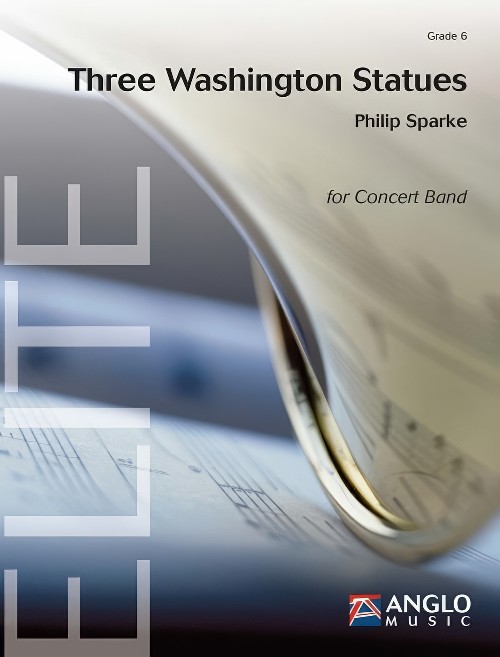 £164.99
£164.99Three Washington Statues (Concert Band - Score and Parts) - Sparke, Philip
Three Washington Statues was commissioned by the United States Army Band "Pershing's Own", led by Colonel Thomas H. Palmatier. Washington D.C. contains some of the world's most iconic monuments, memorials and statues. Philip Sparke has chosen three of these as the inspiration for this piece: 'The Lincoln Memorial' in the form of a Greek Doric temple in which the composer depicts the grandeur of this monument; 'The Martin Luther King, Jr. Memorial' on which steps the iconic speech 'I have a dream' was given - the music is both reverential as well as powerful referring to Martin Luther Kings' speech; and the 'Encore' statue in memory of the world famous African-American composer, pianist and bandleader Duke Ellington. In this final movement, Philip Sparke catches the virtuosic, energetic and unique dynamism of Ellington's' music. Three Washington Statues was commissioned by the United States Army Band "Pershing's Own", led by Colonel Thomas H. Palmatier. Washington D.C. contains some of the world's most iconic monuments, memorials and statues. Philip Sparke has chosen three of these as the inspiration for this piece: 'The Lincoln Memorial' in the form of a Greek Doric temple in which the composer depicts the grandeur of this monument; 'The Martin Luther King, Jr. Memorial' on which steps the iconic speech 'I have a dream' was given - the music is both reverential as well as powerful referring to Martin Luther Kings' speech; and the 'Encore' statue in memory of the world famous African-American composer, pianist and bandleader Duke Ellington. In this final movement, Philip Sparke catches the virtuosic, energetic and unique dynamism of Ellington's' music.Duration: 8:45
Estimated dispatch 7-14 working days
-
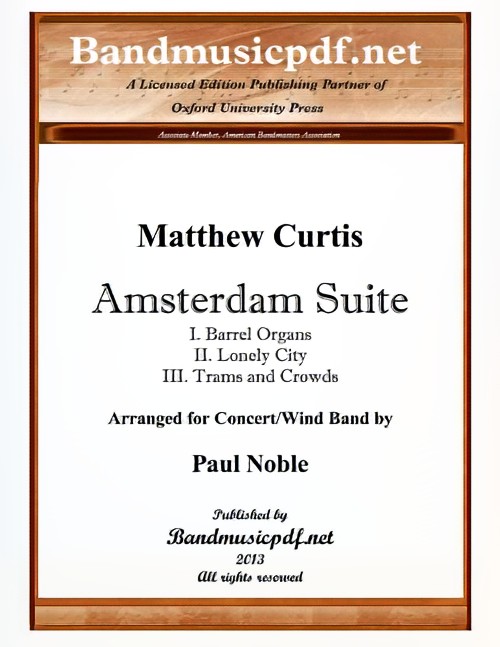 £225.00
£225.00Amsterdam Suite (Concert Band - Score and Parts) - Curtis, Matthew - Noble, Paul
The Amsterdam Suite, written in 1995 and first performed by the Slaithwaite Philharmonic Orchestra the following year, seeks to convey some impressions of a city I have visited several times. It opens with the waltz sequence, Barrel Organs, recalling the hurdy-gurdies positioned at strategic points in the city with the aim of parting tourists with their loose change. The tunes, however, are mine rather than an attempt to reproduce the real thing. Amsterdam takes its Saturday nights seriously, with the result that those who get up (or are still up) early on Sunday morning will find themselves in eerily deserted streets, whose atmosphere to me suggests one instrument above all, the saxophone, which plays a prominent part in Lonely City. The Saturday nights themselves are depicted in Trams and Crowds. I have taken liberties with the chronology for the obvious musical reason of wanting to go out with a bang rather than a whimper. The basic structure is very much that used by Eric Coates for similar piece, a bustling outer section with a quick march trio, presented in a fuller and more embellished orchestration on each of its three appearances. - Matthew Curtis.
Estimated dispatch 7-14 working days
-
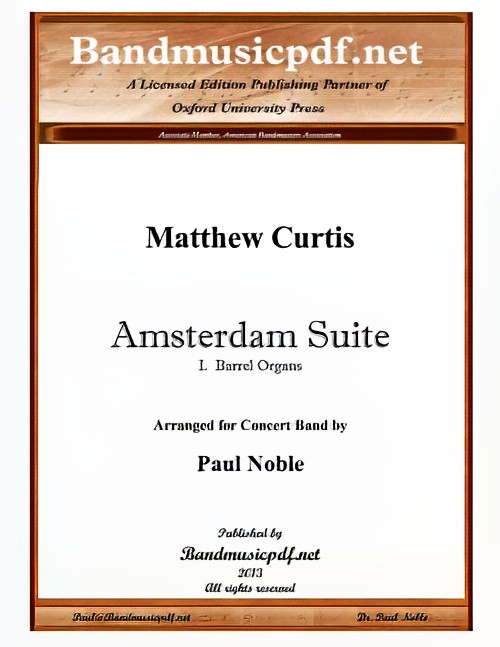 £85.00
£85.00Amsterdam Suite, 1st Movement (Concert Band - Score and Parts) - Curtis, Matthew - Noble, Paul
The Amsterdam Suite, written in 1995 and first performed by the Slaithwaite Philharmonic Orchestra the following year, seeks to convey some impressions of a city I have visited several times. It opens with the waltz sequence, Barrel Organs, recalling the hurdy-gurdies positioned at strategic points in the city with the aim of parting tourists with their loose change. The tunes, however, are mine rather than an attempt to reproduce the real thing. Amsterdam takes its Saturday nights seriously, with the result that those who get up (or are still up) early on Sunday morning will find themselves in eerily deserted streets, whose atmosphere to me suggests one instrument above all, the saxophone, which plays a prominent part in Lonely City. The Saturday nights themselves are depicted in Trams and Crowds. I have taken liberties with the chronology for the obvious musical reason of wanting to go out with a bang rather than a whimper. The basic structure is very much that used by Eric Coates for similar piece, a bustling outer section with a quick march trio, presented in a fuller and more embellished orchestration on each of its three appearances. - Matthew Curtis.
Estimated dispatch 7-14 working days
-
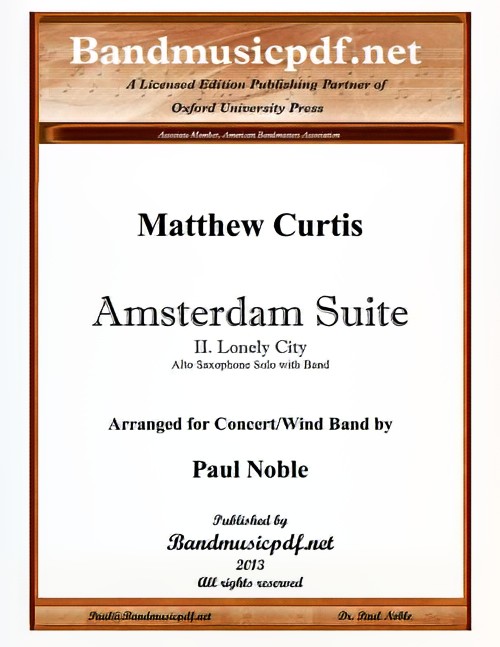 £85.00
£85.00Amsterdam Suite, 2nd Movement (Concert Band - Score and Parts) - Curtis, Matthew - Noble, Paul
The Amsterdam Suite, written in 1995 and first performed by the Slaithwaite Philharmonic Orchestra the following year, seeks to convey some impressions of a city I have visited several times. It opens with the waltz sequence, Barrel Organs, recalling the hurdy-gurdies positioned at strategic points in the city with the aim of parting tourists with their loose change. The tunes, however, are mine rather than an attempt to reproduce the real thing. Amsterdam takes its Saturday nights seriously, with the result that those who get up (or are still up) early on Sunday morning will find themselves in eerily deserted streets, whose atmosphere to me suggests one instrument above all, the saxophone, which plays a prominent part in Lonely City. The Saturday nights themselves are depicted in Trams and Crowds. I have taken liberties with the chronology for the obvious musical reason of wanting to go out with a bang rather than a whimper. The basic structure is very much that used by Eric Coates for similar piece, a bustling outer section with a quick march trio, presented in a fuller and more embellished orchestration on each of its three appearances. - Matthew Curtis.
Estimated dispatch 7-14 working days
-
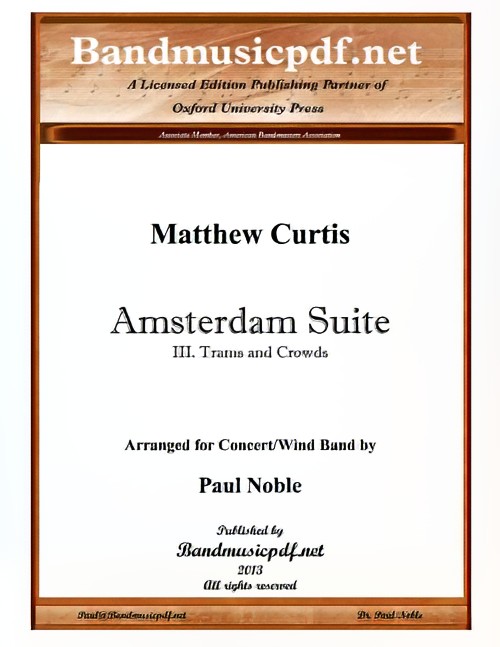 £85.00
£85.00Amsterdam Suite, 3rd Movement (Concert Band - Score and Parts) - Curtis, Matthew - Noble, Paul
The Amsterdam Suite, written in 1995 and first performed by the Slaithwaite Philharmonic Orchestra the following year, seeks to convey some impressions of a city I have visited several times. It opens with the waltz sequence, Barrel Organs, recalling the hurdy-gurdies positioned at strategic points in the city with the aim of parting tourists with their loose change. The tunes, however, are mine rather than an attempt to reproduce the real thing. Amsterdam takes its Saturday nights seriously, with the result that those who get up (or are still up) early on Sunday morning will find themselves in eerily deserted streets, whose atmosphere to me suggests one instrument above all, the saxophone, which plays a prominent part in Lonely City. The Saturday nights themselves are depicted in Trams and Crowds. I have taken liberties with the chronology for the obvious musical reason of wanting to go out with a bang rather than a whimper. The basic structure is very much that used by Eric Coates for similar piece, a bustling outer section with a quick march trio, presented in a fuller and more embellished orchestration on each of its three appearances. - Matthew Curtis.
Estimated dispatch 7-14 working days
-
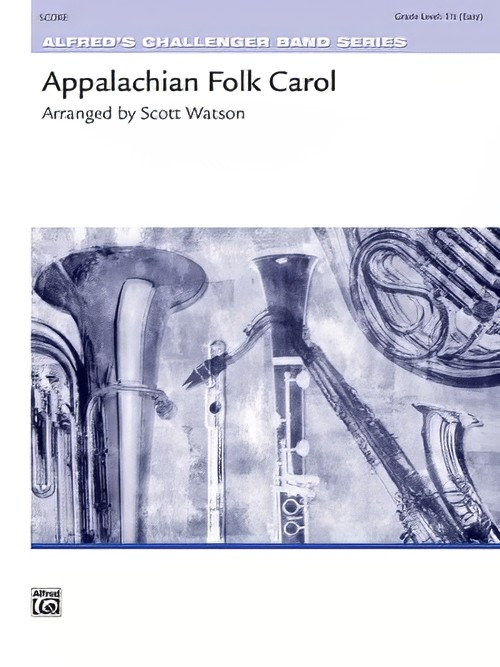 £48.95
£48.95Appalachian Folk Carol (Concert Band - Score and Parts) - Watson, Scott
The Appalachian folk carol, "Jesus, Jesus, Rest Your Head," was collected by folk musicologist (and the composer of the tune, "I Wonder as I Wander"), John Jacob Niles, in the early Twentieth Century. This hauntingly beautiful arrangement of the tune explores the Nativity with peaceful reverence and mysterious wonder. Watson's writing includes expressive tempo changes, lush scoring for full band, transparent episodes for woodwinds, and delicate percussion writing, offering bands ample opportunity for performing with musical beauty and eloquence.Duration: 4.30
Estimated dispatch 7-14 working days
-
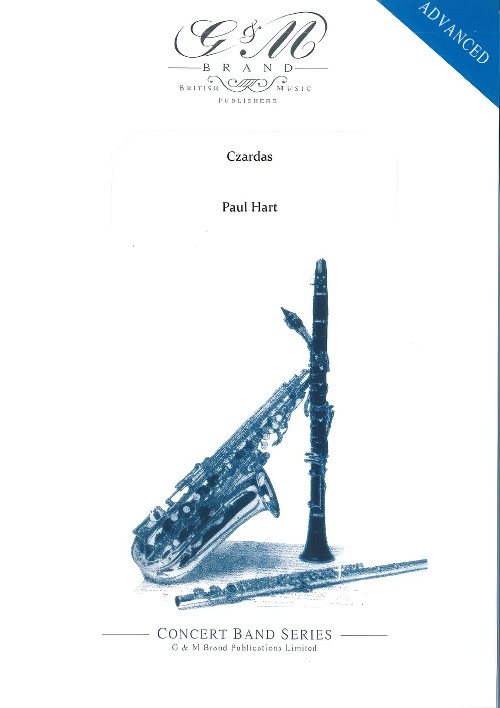 £104.95
£104.95Czardas (Concert Band - Score and Parts) - Hart, Paul
Some time ago Charles Hine, a dear friend, asked me 'Isn't it about time you wrote a Czardas?' It wasn't such a silly idea. I'd studied violin as a child and having learnt numerous show pieces in that style I felt quite at home with the genre. Later in my youth I was lucky enough to work occasionally as accompanist to a lovely lady & singer Eve Boswell, who was partly Hungarian, and was generous enough to give me further insight into the nature of Czardas. Whilst the Wind Ensemble is not the instrumentation one might expect for such a piece the form is albeit rather more long-winded than some of the fiddle 'lollypops'.' - Hart, Paul.
Estimated dispatch 7-14 working days
-
 £20.95
£20.95Czardas (Concert Band - Score only) - Hart, Paul
Some time ago Charles Hine, a dear friend, asked me 'Isn't it about time you wrote a Czardas?' It wasn't such a silly idea. I'd studied violin as a child and having learnt numerous show pieces in that style I felt quite at home with the genre. Later in my youth I was lucky enough to work occasionally as accompanist to a lovely lady & singer Eve Boswell, who was partly Hungarian, and was generous enough to give me further insight into the nature of Czardas. Whilst the Wind Ensemble is not the instrumentation one might expect for such a piece the form is albeit rather more long-winded than some of the fiddle 'lollypops'.' - Hart, Paul.
Estimated dispatch 7-14 working days
